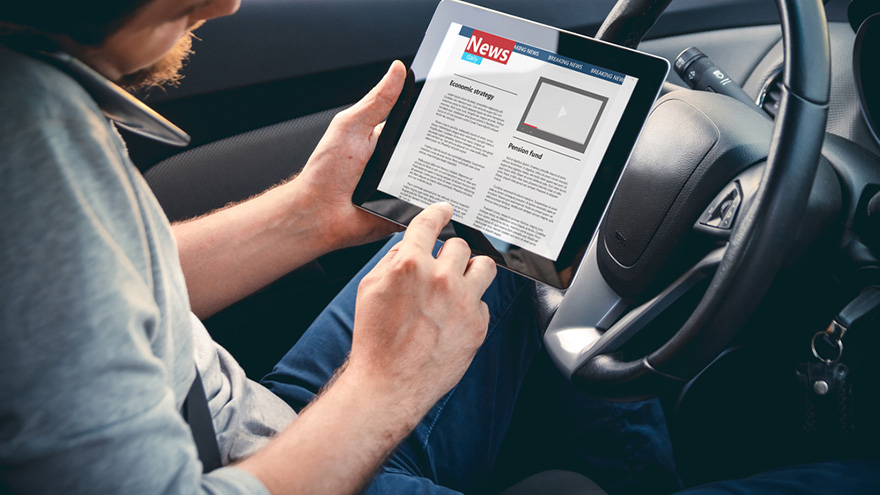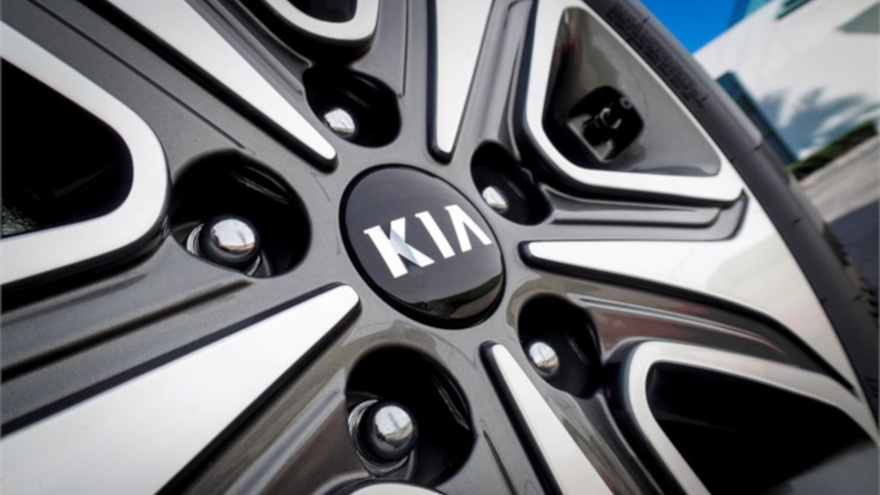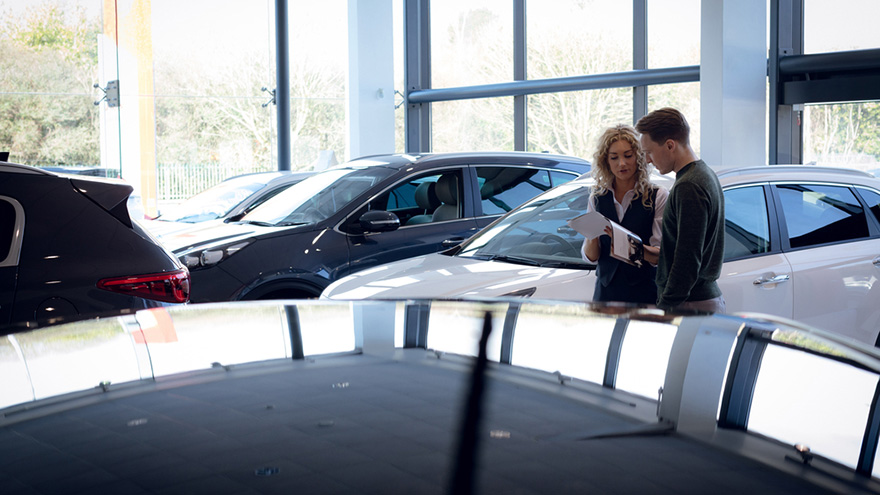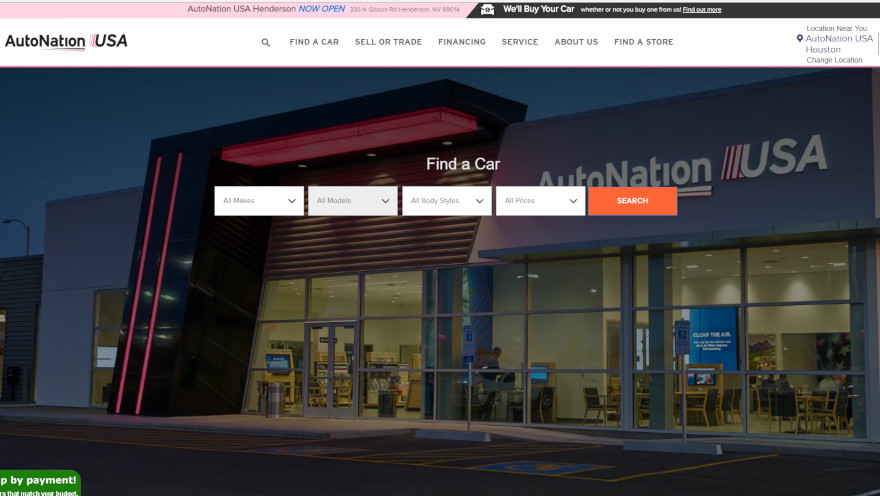Maybe visitors to your store’s website do not want pricing information to purchase a vehicle; but rather are looking for the cost of a specific replacement part or feature upgrade.
To help stores with those inquiries, automotive live chat provider ActivEngage on Thursday announced a new strategic partnership with Auto Parts Kit. Offering automotive parts and accessory recommendations and availability, this partnership is designed to allow ActivEngage chat specialists to execute auto parts and accessory searches in real-time and share them with customers inside chat conversations — all while remaining on the dealer’s website.
“Providing auto dealers with streamlined solutions that enhance the customer experience is our top priority,” ActivEngage co-founder and chief executive officer Todd Smith said. “Partnering with Auto Parts Kit adds to our dynamic in-chat services, including credit score prescreening and auto service scheduling, which makes ActivEngage the chat provider of choice for the nation’s top auto dealers.”
With seamless access to Auto Parts Kit’s robust API integrated within the ActivEngage chat software, ActivEngage chat specialists can now display pricing, images and related parts to customers within chat conversations.
Soon, the company said this strategic partnership also will allow customers to purchase products within chat conversations.
“We are proud to partner with ActivEngage to offer unprecedented access to auto customers and add tremendous value to the dealership experience,” Auto Parts Kit chief executive officer Adam Rouff said.
To learn more and sign up, visit www.autopartskit.com/activengage.
Along with sharing its latest update on the specialty markets, Black Book reported that wholesale prices remained steady and volume a bit constricted as the calendar flipped to September.
The latest Market Insights report highlighted the strength mainstream sedans have had in the market. Coupled with the effects of increased SUV inventory over the last few years, editors acknowledged possible swinging of the pendulum for cars.
“Used sedans are hot in the market as value-conscious consumers look for affordable transportation,” said Anil Goyal, executive vice president of operations at Black Book.
Volume-weighted, editors found overall car segment values increased just a little last week — 0.03 percent. In comparison, Black Book reported market values for cars had decreased by 0.15 percent on average during the prior four-week period.
As Goyal referenced, the midsize car segment experienced the biggest increase, rising 0.24 percent or $21.
Volume-weighted, editors determined overall truck segment values (including pickups, SUVs and vans) softened by 0.11 percent last week. In comparison, the market values had decreased by 0.14 percent on average during the previous four-week period.
Within trucks, Black Book noticed the compact luxury crossover/SUV segment performed the worst, sliding by 0.36 percent or $70.
Among the anecdotes collected by Black Book representatives stationed at sales nationwide, the talk was as much about volume as price, especially in the Southeast.
— From Georgia: “The volume is still down, but the prices are not. Buyers are not thrilled about the extra bidding it takes to secure inventory for their lots.”
— From Florida: “Fewer no-sales today, and about the only vehicles not selling were the large commercial vans.”
— For North Carolina: “An auction GM in North Carolina says that they are consistently selling around 65 percent and believes the high conversions will continue until more supply comes to the physical auctions.”
And talk about volume percolated in the North, too, with the story in Pennsylvania being, “One thing that stood out today was the dealers’ acceptance to higher mileage vehicles which points to the lower supply.”
Finally, a familiar scene unfolded in Massachusetts where Black Book lane watcher said, “The nicer vehicles still bring really strong money but the older, condition challenged ones are a tough sell.”
Update on the specialty markets
As they share regularly, editors also opened a new month by recapping their latest observations of what’s happening in the specialty space.
— Collectibles: With a cumulative total of nearly $370 million, “it’s safe to say that Monterey 2018 was a success,” Black Book said.
— Recreational Vehicles: Editors indicated the average selling price of towables at auction last month crept up about 1.5 percent, reaching another all-time high at just above $15,000.
— Powersports: Black Book determined all segments are down this month in the powersports market. “Most of these are normal seasonal drops, but a few normally strong fall vehicle segments are also down a bit more than is typical for the time of year,” editors said.
— Heavy-Duty: Black Book pointed out that new heavy-duty truck orders are being delivered although the turn-in units are not showing up at auction at the same rate.
— Medium-Duty: Editors closed by noting the used market remains strong despite new inventory adding some downward pressure to wholesale prices.
If your franchised dealership sits among a total of eight rooftops within a span shorter than a test drive, experts say that at least one operation — perhaps where you sit now — has gained new ownership during the past four years.
And it appears that buy/sell pace could intensify.
Kerrigan Advisors pointed to a pair of reasons why the number of second-quarter transactions spiked after a slow start to the year.
According to The Blue Sky Report generated by Kerrigan Advisors and released on Wednesday, new tax law and improved economies of scale and scope are among the trends driving a robust buy/sell market.
The report indicated 75 transactions were completed in Q2, a 92-percent increase over Q1. With consolidators and publicly-traded auto retailers seeing increased earnings as a result of these factors, profitability at dealerships holding steady, and dealerships embracing innovative, profit-driving business models, Kerrigan Advisors predicts that 2018 will mark the fifth consecutive year to see more than 200 transactions.
“We estimate one in eight dealerships have changed hands since 2014 and we believe increasing consolidation means this number will only increase,” said Erin Kerrigan, managing director of Kerrigan Advisors. “Consolidators are leveraging significant opportunities to increase earnings with accretive acquisitions by achieving economies of scale and scope post-transaction.”
Ryan Kerrigan, managing director of Kerrigan Advisors, also added, “Consolidators are finding new ways to grow earnings by employing technology and streamlining their business models, changing their selling systems and introducing new products across their platforms, while the ‘to-be-consolidated’ are squeezing more profit out of their existing business models. And both are being positively impacted by reduced taxes as a result of tax reform.”
However, the Kerrigans did note that while blue sky values remained high in Q2, they were below 2017 levels, partly as a result of rising interest rates and floor plan cost increases.
But, despite a plateauing seasonally adjusted annual sales rate for new-model delivers, The Kerrigan Index, which tracks publicly-traded auto retail companies, continues to rise, indicating that Wall Street believes that scale matters and that anticipated disruptions to auto retail will disproportionately benefit the largest dealership groups.
“There is little doubt that size will be a key driver for future success in auto retail,” Ryan Kerrigan said.
The Blue Sky Report, published by Kerrigan Advisors, is the auto industry's most comprehensive and authoritative quarterly report on dealership M&A activity, as well as franchise values. It includes analysis of all transaction activity for the quarter, and lays out the high, average and low blue sky multiples for each franchise in luxury and non-luxury segments.
Seven other key highlights from the Q2 report include:
• 114 dealership buy/sell transactions were completed in the first half of 2018, compares to 101 transactions in the first half of 2017.
• The number of franchises sold rose 22 percent over the first half of 2017.
• The number of multi-dealership transactions increased to 33 during the first half of 2018, versus 23 in the first half of 2017.
• Domestics maintained their leading position, followed by import non-luxury franchises and import luxury franchises.
• The publics are tracking towards nearly $1 billion of US acquisition spending in 2018, a level that would surpass all prior years, except 2014 when Lithia Motors acquired DCH Auto Group.
• Private dealership groups continue to represent the largest share of dealership acquirers. Only 22 of the estimated 192 franchises that changed hands in the first half of the year, were acquired by public companies.
• Dealership rents rose as compared to 2017, creating concern: the average dealer now has a rent to gross profit of 11.2 percent, a 3.7-percent rise over the 2017 ratio.
The Q2 report outlines three key trends that Kerrigan Advisors anticipate will have a significant impact on the buy/sell market for the remainder of 2018 and into 2019. They include
• Consolidators focus on geographic concentration
• Successful business models command higher blue sky values
• Expense reduction becomes a major consolidation driver
In addition to expense reduction and a focus on geographic concentration, the report emphasized the importance of successful and innovative business models to increased valuations, citing the recent sale of Wilsonville Toyota and Wilsonville Subaru, both of which effectively utilized a no-negotiation sales model, resulting in profitability far higher than industry standards.
“Buyers of dealerships today are students of auto retail. Most spend their days and nights thinking of ways to enhance their business’ profitability and strategically drive earnings growth,” Erin Kerrigan said. “Acquisition opportunities that provide an expanding group with new strategies to grow earnings will command a premium in today’s buy/sell market.”
Kerrigan Advisors monitors conditions in the buy/sell market and publishes an in-depth analysis each quarter in The Blue Sky Report, which includes Kerrigan Advisors’ signature blue sky charts, multiples and analysis for each franchise in the luxury and non-luxury segments. To download the entire report, go to this website.
The company also releases monthly The Kerrigan Index composed of the seven publicly traded auto retail companies with operations focused on the U.S. market. The Kerrigan Auto Retail Index is designed to track dealership valuation trends, while also providing key insights into factors influencing auto retail. To access The Kerrigan Index, go to this website.
ADESA is looking to make returning a vehicle back to the auction as easy as what dealers might experience when those shoes or pants just don’t fit correctly.
On Wednesday, the business unit of KAR Auction Services, launched a new return guarantee product called ADESA Assurance. The company highlighted the new service can allow participating dealers to return eligible vehicles within 21 days for a full refund of the purchase price and associated buy fee.
The program is available to dealers at all 60 ADESA physical auction locations in the U.S. as well as DealerBlock and LiveBlock, ADESA’s online and simulcast auction platforms.
“Everything we do at ADESA is aimed at simplifying the auction experience for our customers,” ADESA president John Hammer said in a news release.
“ADESA Assurance gives dealers greater confidence and flexibility in their purchases to help them keep pace with the always changing market conditions,” Hammer continued. “By reducing the risk of wholesale transactions, ADESA Assurance will help our dealers stay fast, focused and successful.”
Across ADESA, there are thousands of vehicles up for auction at any given time, the duration of which can vary from a few days to just seconds. To capture the inventory they want, dealers often make purchasing decisions with incomplete or deficient information regarding market conditions, a vehicle’s condition or potential reconditioning needs.
The company explained the ability to return a vehicle through ADESA Assurance is aimed at alleviating the uncertainty of these transactions and helping dealers deploy their capital and shift their inventory more quickly.
For customers who enroll in the subscription service, ADESA Assurance will be automatically applied at the time of purchase to all eligible vehicles purchased at ADESA physical auctions, LiveBlock, ADESA UVA and ADESA mobile auctions.
The company added that buyers who only purchase DealerBlock vehicles on ADESA.com can add protection on a vehicle-by-vehicle basis at the time of check-out.
ADESA Assurance applies to vehicles 21 years or newer with a maximum sale price below $100,000 and fewer than 250,000 miles on the odometer.
In a separate message to Auto Remarketing, Hammer responded to an inquiry regarding what kind of feedback from dealers regarding vehicle returns ADESA has receive that helped to cultivate this program.
"ADESA currently offers several different products that help our customers buy with confidence — helping reduce the risk of purchasing a vehicle with undisclosed damage or problems," Hammer said. "We have had a version of ADESA Assurance within our upstream marketplace providing return guarantees to a select sub-set of our inventory. However, we didn’t have a similar product offering for customers buying at our physical auctions.
"Our customers have been asking for this kind of product for some time — our buyers want to buy with confidence. We were able to use our upstream version of ADESA Assurance as a template and customize the product for our in-lane customers," he continued.
Hammer indicated that the company began to develop what now is ADESA Assurance back in January. He described the hurdles ADESA had to clear during the process to get to Wednesday's official launch.
"ADESA Assurance is a combination of two products — upstream and physical auction offering. It took participation from many areas of the company to create a product that is fully integrated into our various platforms and is part of a seamless auction experience," Hammer said.
"We were trying to increase conversion rates and remain profitable. ADESA Assurance gives our customers the confidence they need to make fast purchases in the lanes while alleviating the uncertainty of these transactions and helping dealers deploy their capital and shift their inventory more quickly," he continued.
Now that ADESA Assurance is in motion, Hammer also mentioned some of the metrics and trends the company might be watching to make sure the program is executing well.
"We will be looking at customer adoption and cancellation rates, claims rate percentages and expenses overall and by dealership and the overall financial performance of ADESA Assurance," he said.
"Just like any product at ADESA we are fully committed to its success and the success of our customers who use our products. We will continue to listen to our customers and create programs and solutions that improve their auction experience," Hammer went on to say.
For additional details or to enroll in the subscription service, visit ADESA.com/Assurance.
One of Kia’s flagship dealerships has new owners.
Kerrigan Advisors represented and advised Car Pros Automotive Group in its recent sale of Carson Kia — which the firm said is the highest volume Kia dealership in the U.S. since 2016 — to southern California-based Trophy Automotive Dealer Group (TADG).
Opened in 2017, Kerrigan Advisors highlighted that the dealership's new state-of-the-art facility spans 72,000 square feet and is a flagship in OEM’s national distribution network. This transaction marks the fifth dealership that TADG has purchased in southern California in recent years.
“This was a very big decision for our family. While we have no intention of leaving the car business, we felt that selling our large Kia store in Carson made sense, both for our family and for the strategic direction of the group,” said Matthew Phillips, chief executive officer of Car Pros Automotive Group and son of the founder and chairman, Ken Phillips.
In addition to the Carson store, Car Pros Automotive Group comprises six dealerships in northwest Washington and southern California.
The Phillips family has retailed more than 100,000 Kia units in the U.S., more than any other store.
“I opened my first dealership in Des Moines, Wash., in 1984, based on the ideals of honesty and integrity,” founder Ken Phillips said. “As I look back, for the past 35 years, we’ve held true to those standards in everything we’ve done.
“I am proud to say that our recent transaction was handled in the same fashion,” Ken Phillips continued. “Kerrigan Advisors really helped to provide the expertise we needed to transition our Group toward the next phase of Car Pros automotive retail.”
Kerrigan Advisors has represented on the sale of 72 dealerships since July 2015
“I’d like to thank Kerrigan Advisors for smoothly guiding us through this process, with such a high level of professionalism. They truly understand everything a seller goes through and offered sensitivity, a keen understanding of the current (and future) automotive landscape and support every step of the way,” Matthew Phillips said.
Along with turning new metal, the dealership is also among Kia’s top performers for retailing certified pre-owned vehicles.
“Ken and his family are the top Kia retailers in the United States and have been a huge part of that brand’s success on the West Coast — which is also one of the most demanding and cutting-edge automotive markets in the world,” said Ryan Kerrigan, managing director of Kerrigan Advisors. “From the start, in handling this transaction, we focused on that innovative spirit. This is a crown jewel for the KIA brand, and we were proud to be able to offer Carson Kia the representation it deserved.”
Erin Kerrigan, also managing director of Kerrigan Advisors, added, “We were honored to represent the Phillips family on this big transaction.
“This is a landmark dealership in the Kia network, and we have enjoyed working with the Phillips family to develop their game plan for the next leg of their group’s growth,” she went on to say. “We congratulate Trophy Automotive Dealer Group on adding Carson Kia to their portfolio of Southern California dealerships.”
Gus Paras and Bert Rasmussen of Scali Rasmussen served as legal counsel to Car Pros Automotive Group. Aaron Jacoby of Arent Fox served as legal counsel to Trophy Automotive Dealer Group.
The latest data shows that car row in many other markets besides where your rooftop operates hasn’t changed much in the past few months.
Urban Science released statistics and insights from its 2018 mid-year “Automotive Franchise Activity Report” (FAR), indicating continued stability in the number of franchised dealerships in the United States.
As of July 1, the report highlighted there were 18,252 dealerships (rooftops), a 0.2 percent increase from 18,213 recorded on Jan. 1.
Urban Science indicated that the number of franchises, or brands a dealership sells, also experienced a period of stability, slightly decreasing from 32,029 on Jan. 1 of this year to 32,024 as of July 1.
“Since 2010, the dealership network has set a new normal pattern of stability,” said Mitch Phillips, Urban Science’s global director of data. “The data shows that 98 percent of local markets had virtually no net change.
"That said, the most significant (net) dealership increases occurred in Florida, 10 dealerships; Texas, seven dealerships; New York, five dealerships; Ohio, five dealerships; Minnesota and Tennessee, four dealerships each,” Phillips continued. “An interesting observation is that California, typically on the most active list, was the state that lost the most dealerships to date in 2018.”
Phillips touched another report element that might be of interest to dealer principals and managers.
“Sales throughput for dealers is defined as the number of sales divided by the dealer count,” he said. “With a stable dealer count, the throughput record is controlled by the sales volume.
“With the current range of 2018 sales forecasts being slightly less than 2017, throughput is forecasted to fall around 11 units to 937 units,” Phillips went on to say.
For more information about Urban Science, visit www.urbanscience.com.
AutoNation’s net income from continuing operations rose 11 percent to $97.4 million in its second quarter, aided by its used-vehicle operations, the company reported.
AutoNation CEO Mike Jackson credited the record number of “nearly new” off-lease vehicles returning to the market with underpinning used-vehicle sales at AutoNation and other dealership groups.
“You have 4 million nearly new vehicles coming off lease, a big percentage of which are eligible for extended warranties from the manufacturers through a certified pre-owned program,” Jackson said during AutoNation’s Aug. 1 earnings call with analysts.
“The consumer is coming in, and they have brand new to choose from, nearly new to choose from and pre-owned. This nearly new category is dominated by the franchise dealers. Therefore, we get the first look at this opportunity, and we’re ready for it and have seized it as forecasted several years ago.”
AutoNation USA, the company’s standalone used-vehicle store business, is performing “as expected,” and its “trendline toward profitability is positive,” but the company will wait another quarter before giving a detailed update about its performance, Jackson said.
No additional USA stores this year
“We do not expect to break ground on any additional USA stores this year,” he added.
In the quarter that ended June 30, there were two AutoNation USA stores in the Houston market, one in the Corpus Christi, Texas market and one each in the Phoenix and Las Vegas markets.
For the quarter, AutoNation generated revenue of $5.4 billion, a 2-percent increase over the same period last year.
In the same period, AutoNation’s used unit retail sales increased 3.1 percent to 60,081, and its retail gross profit per used vehicle retailed was up 14.0 percent to $1,448.
Assisted by AutoNation’s one-price strategy and on a same-store basis, used-vehicle gross profit was $87.5 million, up 21.9 percent compared to the year-ago quarter. In the same period, the company’s peers’ same-store average used-vehicle gross profit was up 5 percent, according to AutoNation executive vice president for sales and COO, Lance Iserman, who was also on the call.
AutoNation improved its same-store used unit retail sales by 4.7 percent to 58,542 and generated a gross profit per used vehicle retailed of $1,455. That is “an increase of $180 or 14 percent, while our peers’ average was down 2 percent compared to the second quarter of 2017,” Iserman said.
‘Significant margin pressure’
As reported by other publicly held dealership groups, AutoNation had “significant margin pressure” on its new-car sales, resulting from “disruptive marketing and sales incentives,” Iserman said.
New vehicles sold at AutoNation’s BMW, Honda and Nissan dealerships accounted for “probably 70 percent” of the margin erosion experienced by the group, and “we expect to see continued pressure for the balance of the year,” Iserman said.
Gross margins on new vehicles sold at AutoNation’s domestic brand dealerships are “basically flat for us, slightly up,” he added.
Jackson said BMW has a “product cycle issue”, and AutoNation should be in a better position when new BMW products are launched next year.
AutoNation’s new unit retail sales on a non-same store basis, decreased 1 percent to 79,054, and its new-vehicle gross profit per vehicle retailed dropped 8.7 percent to $1,579.
Finance and insurance gross profit per vehicle retailed rose 7.5 percent to $1,781.
Growing consumer acceptance of AutoNation’s branded F&I products is helping bolster the company’s F&I gross profits, Jackson said.
“The improvement is primarily driven by more customers choosing to get a product from us rather than us getting more from each customer we already have,” he said.
More with Waymo
During the call, Jackson said AutoNation expanded its relationship with Waymo, a self-driving vehicle technology company. The deal now allows AutoNation customers to get around in Waymo vehicles while their personal vehicles are being serviced at AutoNation dealerships in Phoenix.
Last November, AutoNation announced that it would provide mechanical and cosmetic repairs to maintain Waymo’s self-driving fleet. Waymo is a subsidiary of Alphabet which also owns Google.
Waymo and AutoNation have a “strategic relationship” and AutoNation wants to grow with Waymo wherever it makes sense, Jackson said. But he also cautioned that “as far as profits, well, that’s something down the road.”
“This is at the beginning of a journey, and it’s important for learning and to partner and to go from there. But with the most recent announcement, it says the relationship is working; it’s working well, and I expect it to continue to grow.”
Acquisitions
AutoNation also announced that it:
* Acquired Shelley BMW in Southern California, which is expected to generate approximately $140 million in annual revenue and retail approximately 2,600 new and used vehicles. It is the company’s seventh BMW store in California and its 17th BMW store nationally.
* Signed an agreement to acquire a collision center located in its Dallas market. It is the company’s 81st collision center nationally.
* Is on pace to earn approximately $100 million of incremental gross profit from its branded parts initiative in 2018.
A pair of monthly wholesale market trackers showed price increases in July, propelled in part by what trucks and utilities are fetching in the lanes nowadays.
How are dealers reacting?
Well, one weekly sale observer described the scene as “many buyers were left shaking their heads.”
So let’s get into the numbers of what’s leaving dealers with visible signs of frustration.
According to ADESA Analytical Services’ monthly analysis of wholesale used-vehicle prices by vehicle model class, KAR Auction Services chief economist Tom Kontos reported that wholesale used vehicle prices in July averaged $10,902 — up 0.1 percent compared to June and up 0.1 percent relative to July of last year.
Meanwhile over at RVI Group, the firm’s Used Vehicle Price Index (UVPI) for the United States came in at 1.057 in July compared to 1.034 in June and 1.014 last July. RVI calculated that readings represented an increase of 2.2 percent month-over-month and 4.2 percent year-over-year.
In his monthly Kontos Kommentary, the KAR expert explained that actually more car and truck segments showed month-over-month declines than gains with a slight uptick in the mix of trucks accounting for the small overall average gain. Kontos pointed out that truck model classes now make up 53 percent of the total units sold at auction with the 50 percent threshold having been reached about a year ago.
“After four months of year-over-year declines, average wholesale used vehicle prices registered a slight increase in July,” said Kontos, who is among the collection of experts coming to Used Car Week, which begins on Nov. 12.
“However, this was primarily due, once again, to a shift in sales mix towards the truck model classes and the continued influx of younger off-lease vehicles, both of which have been tending to drive up average prices. Still, the summer market for used vehicles appears to be solid, both at the wholesale and retail levels,” Kontos continued.
The editors at Black Book are responsible for watching wholesale prices as well as collecting anecdotes from the lanes. According to the latest Market Insights report, Black Book determined small pickups and full-size cars both showed gains this past week, even though we’re getting deep into summer.
“Subcompact cars have started to show some weakness after a strong retention trend earlier this year. On the other hand, sub-compact crossovers are continuing to do relatively well,” said Anil Goyal, Black Book executive vice president of operations, who also will be on hand for Used Car Week, which is being orchestrated at the Westin Keirland Resort and Spa in Scottsdale, Ariz.
Volume-weighted, Black Book reported that overall car segment values decreased by just 0.20 percent last week. In comparison, editors mentioned values had decreased at a rate of 0.22 percent per week during the previous four weeks.
Among car segments, sub-compact car values decreased the most last week, softening by 0.56 percent or $34.
Again volume-weighted, Black Book noticed that overall truck segment values (including pickups, SUVs, and vans) dipped by 0.15 percent last week. Editors noted that values had decreased at a rate of 0.24 percent per week during the previous four weeks.
Within truck segments, full-size van values decreased the most last week, dropping by 0.50 percent or $74.
In light of all of those data points, Black Book’s lane observers stationed at sales nationwide shared some pretty vivid dealer responses to how managers are juggling their inventory needs against their floor-plan availability.
— From Michigan: “The retail market remains somewhat sluggish in contrast to what happened at the wholesale auction this week. Many buyers were left shaking their heads at the inflated prices on the block.”
— From Massachusetts: “Trucks still rule, and the money was strong except for the poorer quality vehicles.”
— From Georgia: “The sale started off with a lot of activity and very few no-sales. The conversion percentages soon dropped as the floors seemed to be too ambitious.”
— From California: “Strong bidding in person and online, resulting in a really good August sale.”
Whether the sale originated in the Golden State or elsewhere nationwide, if the event included fleet and off-lease units that were 3 years old and less than 45,000 miles on the odometer, Kontos shared how buyers needed to come up with more cash to make the hammer drop in their favor for those vehicles.
Kontos indicated that when holding constant for sale type, model year age, mileage and model class segment, prices for midsize cars in that late-model category rose 5.9 percent or $676 year-over-year in July to $12,169. Prices for midsize SUV in this wholesale space increased 2.2 percent or $435 year-over-year to $20,541.
“Once again, midsize car prices outperformed prices for midsize SUVs and crossovers, as the incoming supply of trucks continues to outpace that of cars,” Kontos said.
“The strength of prices for both groups in this analysis indicates that upstream sales are preventing an oversupply of off-lease units from reaching physical auction lots,” continued Kontos, who elaborated about the wholesale market in a video available here as well as at the top of the page.
Kontos went on to mention more data from KAR Auction Services — a member of the Automotive Intelligence Council — that indicated average wholesale prices for used vehicles remarketed by manufacturers in July rose 3.3 percent month-over-month and 3.4 percent year-over-year.
Kontos also noted that prices for fleet/lease consignors ticked up 0.4 percent sequentially and 8.1 percent annually in July.
Furthermore, Kontos mentioned that average prices for dealer consignors moved 2.0 percent higher versus June but slid 2.3 percent relative to July of last year.
The KAR chief economist closed his latest Kontos Kommentary by sharing information from Autodata that indicated July certified pre-owned sales softened 7.5 percent from the prior month and 1.9 percent year-over-year based on fewer selling days. On a year-to-date basis, Kontos added that Autodata has CPO sales up 2.8 percent versus last year.
ADESA Wholesale Used-Vehicle Price Trends
| |
Average |
Price |
($/Unit) |
Latest |
Month Versus |
| |
August 2018 |
July 2018 |
August 2017 |
Prior Month |
Prior Year |
| |
|
|
|
|
|
| Total All Vehicles |
$11,049 |
$10,892 |
$10,947 |
1.4% |
0.9% |
| |
|
|
|
|
|
| Total Cars |
$8,695 |
$8,511 |
$8,732 |
2.2% |
-0.4% |
| Compact Car |
$6,485 |
$6,427 |
$6,624 |
0.9% |
-2.1% |
| Midsize Car |
$7,594 |
$7,449 |
$7,639 |
1.9% |
-0.6% |
| Full-size Car |
$7,517 |
$7,258 |
$7,063 |
3.6% |
6.4% |
| Luxury Car |
$13,597 |
$13,295 |
$14,003 |
2.3% |
-2.9% |
| Sporty Car |
$14,404 |
$14,213 |
$13,903 |
1.3% |
3.6% |
| |
|
|
|
|
|
| Total Trucks |
$13,040 |
$12,914 |
$13,036 |
1.0% |
0.0% |
| Minivan |
$8,228 |
$7,927 |
$8,777 |
3.8% |
-6.3% |
| Full-size Van |
$13,306 |
$13,202 |
$11,875 |
0.8% |
12.1% |
| Compact SUV/CUV |
$10,768 |
$10,793 |
$10,468 |
-0.2% |
2.9% |
| Midsize SUV/CUV |
$11,064 |
$10,984 |
$11,407 |
0.7% |
-3.0% |
| Full-size SUV/CUV |
$13,374 |
$13,185 |
$13,353 |
1.4% |
0.2% |
| Luxury SUV/CUV |
$18,482 |
$18,498 |
$18,947 |
-0.1% |
-2.5% |
| Compact Pickup |
$10,229 |
$9,790 |
$9,599 |
4.5% |
6.6% |
| Full-size Pickup |
$16,636 |
$16,578 |
$16,989 |
0.4% |
-2.1% |
Source: ADESA Analytical Services. July data revised.
Following up from arranging a strategic partnership with the National Independent Automobile Dealers Association, HyreCar — the carsharing marketplace for ridesharing — announced on Tuesday that it is expanding its unique dealer focused “path to ownership” program with stores in six different cities throughout the United States.
The development potentially adds more than 500 vehicles to the platform. Rideshare drivers are now able to rent and drive-to-own vehicles that are listed on the HyreCar platform by participating dealers, which now include:
— Burlington Auto Group, based in Philadelphia
— Sims Mitsubishi in Cleveland
— 1st Place Auto Stores in Dallas
—Don’s Auto Group, based in New Orleans market
—M & S Auto Sales in Atlanta
—Benchmark Auto Sales in Asheville, N.C.
Each dealer location will have a customized driver sign-up kiosk in their showroom to actively promote the HyreCar program.
HyreCar’s aim is to meet an overwhelming dealer demand to enter the mobility-as-a-service (MaaS) industry throughout the U.S. The HyreCar-DriveItAway alliance is now executing a unique dealer program that can give participating dealers the opportunity to offer vehicles to new ridesharing drivers for temporary use, as a means to generate funds towards a down payment for vehicle ownership.
In cooperation with a national ridesharing company, HyreCar’s partner DriveItAway is installing customized sign-up kiosks inside participating dealerships, where potential rideshare drivers can apply to drive. Once approved, drivers can participate in the “Drive for your Down Payment” program.
With this program, new driver candidates are provided a temporary vehicle by the dealership, through the HyreCar dealership platform, to raise money through rideshare driving, for a down payment to buy the vehicle of their choice, regardless of past credit history.
“We see this program as a win for everyone,” said Wayne Hileman, owner of Burlington Auto Group, one of the pilot dealers to launch this program. “We make money supplying temporary vehicles, and in the process, nurture a new customer to buy a vehicle.
“We are delighted to empower new rideshare drivers to purchase a vehicle through the ‘on-demand’ employment opportunity provided by the ridesharing company,” Hileman continued. “Additionally, the rideshare company gets a new, loyal driver, dedicated to building his or her own driving business.”
The combination of these six stores joining up with NIADA members, HyreCar chief executive officer Joe Furnari is upbeat on the company's future, which also has executed a successful initial public offering.
“The reception to our dealer enabling program has been overwhelming,” Furnari said. “As a result, we are mobilizing very quickly to meet dealer demand all over the United States. These dealer additions will help us meet the increasing demand for ridesharing-approved vehicles, while also adding additional vehicles to our growing platform.”
HyreCar continues to make inroads into established segments of the automotive industry.
The start-up designed to create a carsharing marketplace for ridesharing and the National Independent Automobile Dealers Association (NIADA) have entered into a strategic partnership, through its alliance with DriveItAway, a current NIADA National Member Benefits partner.
HyreCar’s aim is to meet what it calls an “overwhelming” dealer demand to enter the mobility as a service (MaaS) industry throughout the U.S. by serving the NIADA’s 17,000 dealership members. Association leadership said this partnership expansion continues NIADA’s commitment to helping member auto dealers better understand, and provide critical resources to implement a successful MaaS business.
“For the past six months, we’ve been speaking at trade events such as the NIADA Convention about the opportunities dealers have to profitably expand into new areas of shared mobility, particularly in providing temporary used vehicles to new Lyft drivers as a path to ownership,” DriveItAway founder and chief executive officer John Possumato said. “We were overwhelmed by the number of dealers who wanted in, to start up with us right away.
“Our new integration with HyreCar allows us immediate access to an experienced, dedicated team to scale our program right away, so we can now turn those dealers on to new profit opportunities without any delay in building out infrastructure,” Possumato continued.
DriveItAway can provide NIADA members with the tools to offer a subscription model car sharing platform. The partnership with HyreCar adds seamless turnkey self-service software, all insurance coverages and training to allow dealers to quickly and profitably add a cents-per-mile model to the traditional one car sale/one profit scenario.
NIADA members using DriveItAway's turnkey program can also offer the Lyft Your Down Payment program, which provides new Lyft drivers with immediate temporary vehicles to drive at a daily or weekly rate as a path to ownership, allowing them to raise money for a down payment to buy the vehicle of their choice — offered by the participating dealership.
“We are continuing to build partnerships with automotive industry leaders to drive our mission of building roads to financial freedom,” HyreCar CEO Joe Furnari said. “We are excited to become the mobility solution for independent dealers who want to tap into the growing car sharing industry through the DriveItAway NIADA National Member Benefit program.”
NIADA senior vice president of member services Scott Lilja said working with DriveItAway's dealer program, now greatly expanded through its relationship with HyreCar, gives NIADA members the opportunity to create an immediate new profit center, expand their portfolio of qualified buyers and sell more vehicles.
“This partnership expansion continues our commitment to helping our member auto dealers better understand, and to provide critical resources to implement, a successful mobility as a service business,” he said. “DriveItAway and HyreCar tools and resources provide our members with an invaluable and profitable experience in this expanding business sector, all within their current dealership infrastructure and without having to make substantial investments.”
For interested dealers, NIADA will be hosting an educational webinar on Thursday beginning at noon ET. To register, go to http://www.lyftdealers.com/webinar-registration.












